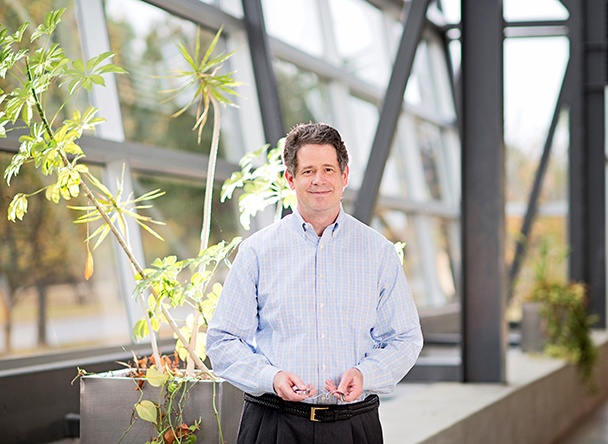Strong Medicine: Health Care Startups The Right Prescription For Tech Developer
by November 9, 2015 12:00 am 512 views

For Calvin Goforth, mastery of science and technology seems to come easily.
Within his work history, science-related jobs that many people might find to be incredibly difficult do not seem to pose much of a challenge to him. For example, he described a stint developing space shuttle performance analysis software at RocketDyne as “taking a breather.”
Goforth worked at the high-profile, southern California-based rocket engine design and production company in the mid-’80s, and he described it as a rest stop between college and graduate school — an opportunity to earn some money and also to experience the excitement of a front-row seat for shuttle testing.
With a father who was a chemist, science has long been a focal-point for Goforth.
His interests led to an undergraduate degree in aerospace engineering from the University of Texas at Austin, a part-time job with NASA and, later on, a Ph.D. from Stanford University in mechanical engineering, with a minor in electrical engineering.
Goforth’s business acumen, the other cornerstone of his life’s work, was developed later, after he started a computer-based machine control company in 1994.
When that business sold after a few years, Goforth quickly found his niche as founder and CEO of VIC Technology Venture Development. At VIC, Goforth draws upon his extensive science and tech knowledge, along with his experience as an entrepreneur, to help early-stage technology companies bring their products to market.
As a business owner, Goforth faced obstacles he never anticipated, and he used that experience as an opportunity to learn.
“I made a lot of mistakes in that first business. But we have continued to get better,” Goforth said. “I’m a lifelong learner.”
VIC is a team of 15 experienced professionals with a variety of skillsets covering a broad range of principles.
The team generally gets involved at the formation stage of the company, executing a set of processes that help lay a foundation for success, Goforth said.
VIC started in 2001 as a consulting company, but in 2003 switched to a development model.
Of the 15 businesses VIC lists as its portfolio companies, those it has partnered with since its founding, more than half of them are related to the medical field.
One of those companies, SFC Fluidics, is headquartered near VIC in the Arkansas Research and Technology Park in Fayetteville.
It is working to develop an insulin pump that Goforth said is smaller, more accurate and less expensive than anything out on the market and anything he is aware of in development.
The pump has possible applications outside of diabetes management, in creating a real-time body-monitoring and drug-delivery loop.
For example, the pump would be used in pain management to administer only the amount of pain medication that is needed, making it more effective and also preventing addiction, Goforth said.
He believes the drug-looping industry will only grow, and SFC Fluidics is poised to benefit.
“SFC Fluidics has the potential to be a billion-dollar company,” Goforth said. “Not a million-dollar company, a billion-dollar company.”
Each year, VIC’s team looks at about 1,500 technologies, a list which it whittles down to 20 businesses that are given intensive opportunity assessments. Of those, VIC selects four to work with.
The criteria for VIC’s involvement includes that the companies are identified as having strong technologies with a lot of commercial potential, Goforth said. A lot of medical-related companies fit the bill.
Also, health care-related technology makes up a large portion of the research and development happening at universities, where VIC gets many of its licensing opportunities.
Other companies with which VIC works are not in the medical industry, but they still address health and wellness.
For example, TiFiber, based in the tech park, makes an antimicrobial plastic that has applications in medical devices and wound care dressings, in addition to soaps and personal care products.
Goforth is CEO of TiFiber and BioDetection Instruments, also based in the tech park.
BioDetection develops technology to rapidly detect pathogens and pesticide residues in both food and water.
VIC also counts among its portfolio companies NanoMech and Ascendant Dx, both of Springdale, although it is no longer involved in the daily operations of either company.
The technologies in VIC’s portfolio often require extensive research and testing and are often subject to government regulation before they are brought to market. These factors mean the launch takes much more time and money than it does for other types of companies.
“If you’re starting with a state-of-the-art technology, only at the lab stage, and there’s no independent proof of concept, it’s going to take some time and millions of dollars to get that product to market,” Goforth said.
In the past few years, the VIC team has made improvements to its process, in an effort to expedite it.
VIC has, for example, made inroads to provide direct access to capital for its companies.
In 2013, Goforth founded the VIC Investor Network, through which VIC automatically provides $250,000 in startup money to any portfolio company that is approved by its board.
Goforth has also worked to bolster the firm’s efforts by starting the VIC Venture Fund, the goal of which is to raise $50 million.
In addition, VIC has continually added branch offices at strategic locations throughout the U.S., near intellectual property hotspots like Annapolis, Maryland, Boston and, most recently, San Diego.
Goforth is also in talks with several business development firms in China to create partnerships that allow VIC’s companies to simultaneously launch and grow in both the U.S. and Chinese markets.
